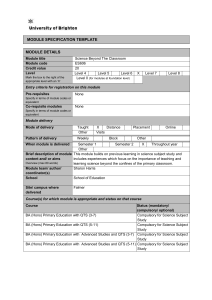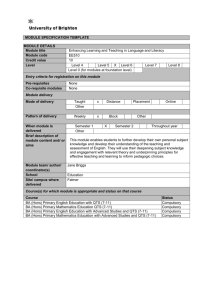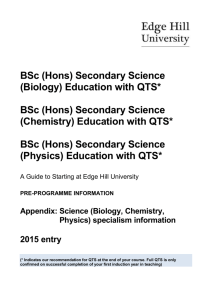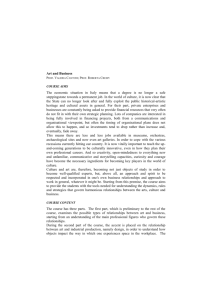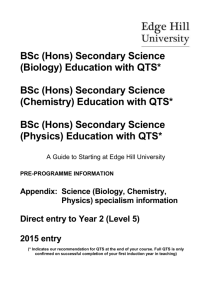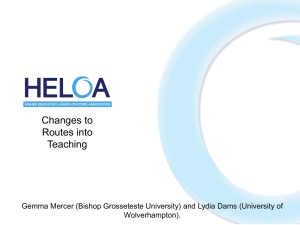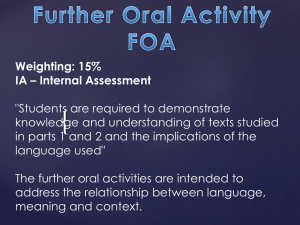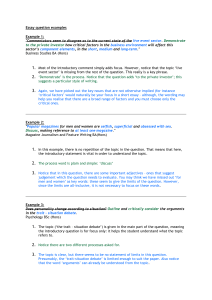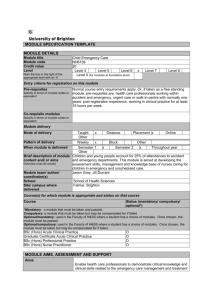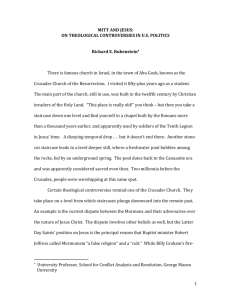module aims, assessment and support
advertisement
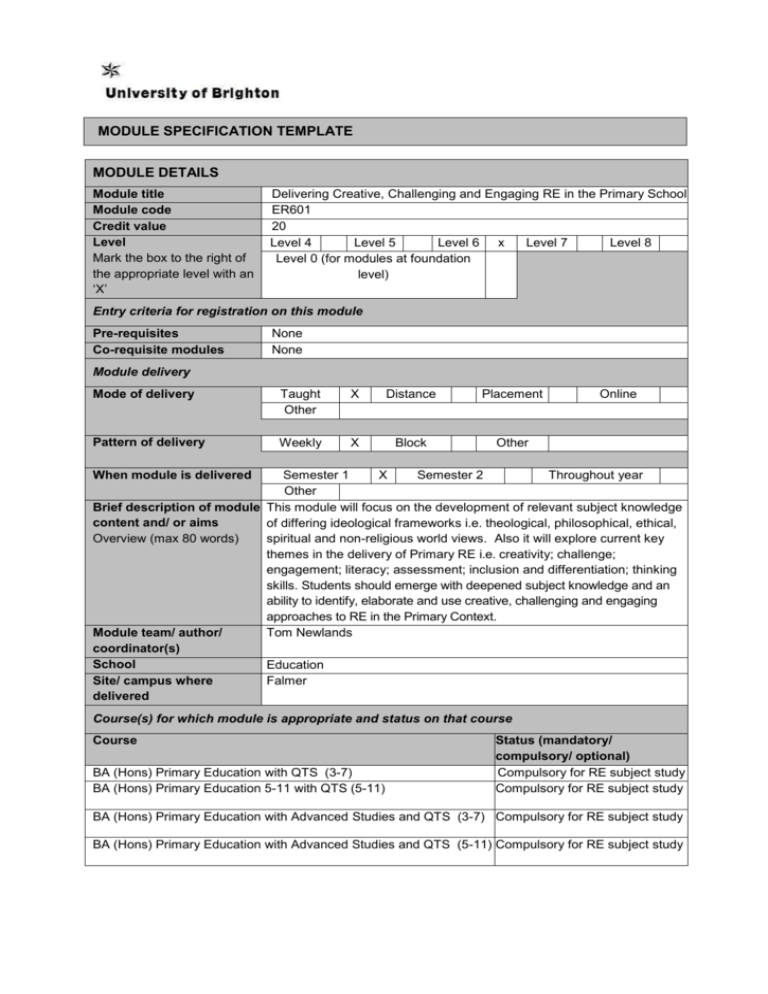
MODULE SPECIFICATION TEMPLATE MODULE DETAILS Module title Module code Credit value Level Mark the box to the right of the appropriate level with an ‘X’ Delivering Creative, Challenging and Engaging RE in the Primary School ER601 20 Level 4 Level 5 Level 6 x Level 7 Level 8 Level 0 (for modules at foundation level) Entry criteria for registration on this module Pre-requisites Co-requisite modules None None Module delivery Mode of delivery Taught Other X Distance Placement Pattern of delivery Weekly X Block Other Online When module is delivered Semester 1 X Semester 2 Throughout year Other Brief description of module This module will focus on the development of relevant subject knowledge content and/ or aims of differing ideological frameworks i.e. theological, philosophical, ethical, Overview (max 80 words) spiritual and non-religious world views. Also it will explore current key themes in the delivery of Primary RE i.e. creativity; challenge; engagement; literacy; assessment; inclusion and differentiation; thinking skills. Students should emerge with deepened subject knowledge and an ability to identify, elaborate and use creative, challenging and engaging approaches to RE in the Primary Context. Module team/ author/ Tom Newlands coordinator(s) School Education Site/ campus where Falmer delivered Course(s) for which module is appropriate and status on that course Course BA (Hons) Primary Education with QTS (3-7) BA (Hons) Primary Education 5-11 with QTS (5-11) Status (mandatory/ compulsory/ optional) Compulsory for RE subject study Compulsory for RE subject study BA (Hons) Primary Education with Advanced Studies and QTS (3-7) Compulsory for RE subject study BA (Hons) Primary Education with Advanced Studies and QTS (5-11) Compulsory for RE subject study MODULE AIMS, ASSESSMENT AND SUPPORT Aims This module will focus on the development of relevant subject knowledge of differing ideological frameworks i.e. theological, philosophical, ethical, spiritual and non-religious world views. Also it will explore current key themes in the delivery of Primary RE i.e. creativity; challenge; engagement; literacy; assessment; inclusion and differentiation; thinking skills. Students should emerge with deepened subject knowledge and an ability to identify, elaborate and use creative, challenging and engaging approaches to RE in the Primary Context. Learning outcomes Students will be able to: 1. show evidence of an extended understanding of ideological frameworks; 2. demonstrate skill and critical engagement in the problematisation of subject content; 3. securely explain and illuminate current themes in the delivery of primary RE; 4. be thoroughly conversant with the sources and agencies in the professional development of Religious Education. Content This module will focus on the development of relevant subject knowledge of differing ideological frameworks i.e. theological, philosophical, ethical, spiritual and non-religious world views. Also it will explore current key themes in the delivery of Primary RE i.e. creativity; challenge; engagement; literacy; assessment; inclusion and differentiation; thinking skills. Students should emerge with deepened subject knowledge and an ability to identify, elaborate and use creative, challenging and engaging approaches to RE in the Primary Context. Learning support Books: Ashton, E. (2000) Religious Education in the Early Years, London: Routledge. Erricker, C., Lowndes, J. & Bellchambers, E. (2011) Primary Religious Education: A New Approach, Abingon: David Fulton. Mackley, J. & Draycott, P. (2012) A to Z: Practical Learning Strategies, Birmingham: Christian Education Publications. McCreery, E. (2008) Teaching RE: Primary and Early Years, Exeter: Learning Matters. Rivett, R. (Ed) (2007) A Teacher’s Handbook of RE (3rd Ed), Birmingham: CEM Publications. Journals: British Journal of Religious Education RE Today Websites: all accessed April 2013 BBC Religions: http://www.bbc.co.uk/religion/religions/ RE Online http://www.reonline.org.uk/ The East Sussex Agreed Syllabus for RE : https://czone.eastsussex.gov.uk/teachinglearning/curriculum/religi ouseducation/Pages/syllabus.aspx Teaching and learning activities Details of teaching and learning activities Scheduled Tutorials Presentations Seminars Unscheduled Fieldwork/Visits Wider reading Follow-up work Assessment Tasks Allocation of study hours (indicative) Where 10 credits = 100 learning hours Study hours SCHEDULED Tutorials Presentations Seminars 10 10 40 GUIDED INDEPENDENT STUDY Fieldwork/Visits Wider reading Follow-up work Assessment Tasks 10 45 45 40 PLACEMENT TOTAL STUDY HOURS 200 Assessment tasks Details of assessment on this module Task 1 (Weighting: 50%) A written submission of 2,000 words in which students select a question or issue to explore in the context of theological, philosophical, ethical, spiritual or non religious worldviews. Task 2 (Weighting: 50%) In pairs, students deliver a 30 minute workshop exploring an aspect of a relevant theme in primary RE i.e. creativity; literacy; assessment; inclusion and differentiation; thinking skills. Each task will be marked on a percentage basis. In task 2, both students in a pair will receive the same mark. (1000 word equivalence) Referral tasks: Task 1: reworking of original task. Task 2: an individual written articulation of a CPD workshop in a chosen area relevant to the primary context (1000 words). Types of assessment task1 Indicative list of summative assessment tasks which lead to the award of credit or which are required for progression. WRITTEN Written submission 50% Workshop presentation 50% COURSEWORK PRACTICAL EXAMINATION INFORMATION Area examination board Combined Area Examination Board (Religious Studies Area) Refer to Faculty Office for guidance in completing the following sections External examiners Name Position and institution Date appointed Date tenure ends QUALITY ASSURANCE Date of first approval September 2013 Only complete where this is not the first version Date of last revision Only complete where this is not the first version Date of approval for this version September 2013 Version number 1 Modules replaced Specify codes of modules for which this is a replacement Available as free-standing module? Yes No 1 Set exercises, which assess the application of knowledge or analytical, problem-solving or evaluative skills, are included under the type of assessment most appropriate to the particular task. x
